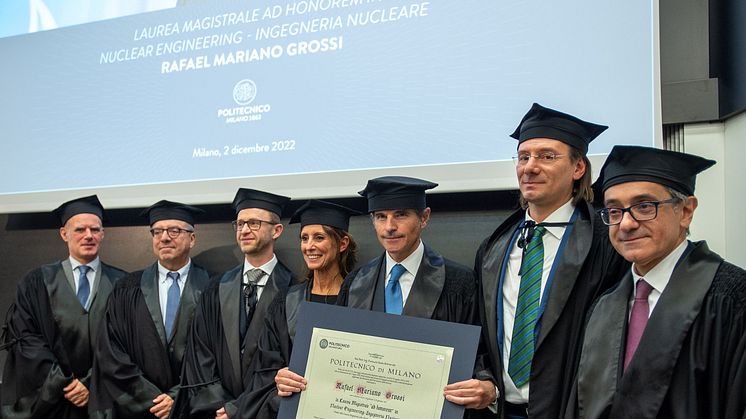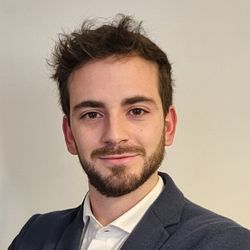
Press release -
Rafael Mariano Grossi, Director of IAEA, receives Politecnico di Milano honorary degree in Nuclear Engineering
For his work in promoting the peaceful use of nuclear science and technology in sectors crucial to sustainable development
Milan, 2 December 2022 – Rafael Mariano Grossi has been awarded an Honorary Degree in Nuclear Engineering by the Politecnico di Milano.
Following greetings from Professor Giovanni Lozza, Director of the Department of Energy and the Address of Honour by Professor Matteo Passoni, Coordinator of the Council for the Nuclear Engineering Program, Rafael Mariano Grossi gave his Address of Recognition.
The ceremony concluded with the proclamation of the Honorary Degree, preceded by the motivations, read by Professor Antonio Capone, Dean of the School of Industrial and Information Engineering:
“The School of Industrial and Information Engineering awards the Honorary Laurea Magistrale (equivalent to Master of Science; hereafter LM) in Nuclear Engineering to Rafael Mariano Grossi, Director General (DG) of the International Atomic Energy Agency (IAEA) since 2019, as recognition of his exemplary initiatives to promote and deploy the peaceful use of nuclear science and technology, with applications of paramount relevance in areas crucial for achieving the Sustainable Development Goals (SDGs) set forth by the United Nations.
As a senior diplomat with decades of experience in leadership roles in important national and international bodies, Rafael M. Grossi has been able to make an outstanding and effective impact during his service as DG of IAEA. Said impact concerns the following areas, which are undoubtedly specific merits for the award of the Honorary LM in Nuclear Engineering:
- Development and enhancement of IAEA initiatives for the comprehensive dissemination of nuclear expertise on all aspects pertaining to sustainable development of mankind and in every country around the world, from applications in medicine to those in agriculture, from energy to the development of advanced materials and the protection of cultural heritage, so as to also contribute to achieving the United Nations’ SDGs
- Promotion of numerous initiatives launched by the IAEA to enhance the role that nuclear engineering plays in climate change prevention, mitigation and adaptation initiatives, such as the study of marine ecosystems and ocean acidification, and the impact of carbon dioxide on a global scale
- Direct, first-hand involvement in the peaceful and safe use of nuclear energy, always incorporating care and attention to the workers, whether they belong to the IAEA or to local institutions
- Direct, first-hand involvement in fundamental nuclear proliferation deterrence and international crisis management activities, in connection with aspects of nuclear technology involvement
- Promotion of initiatives aimed at bridging the gender gap in the nuclear field through the establishment of the IAEA scholarship programme 'Marie Sklodowska-Curie Fellowship Programme', dedicated to supporting female students’ education in nuclear disciplines worldwide; and the recently announced establishment of the 'Lise Meitner Programme', aimed at increasing the presence of talented women in the nuclear sector.
The relevance of all of these initiatives, the importance of the sectors that they target and the specific contribution of Rafael M. Grossi fully align with the educational and cultural objectives of the Master of Science in Nuclear Engineering. They provide a unique and enlightening example of the effective performance of a nuclear engineer’s duties and are a source of inspiration for all those who work in this sector and, more importantly, to future generations of students”.
RAFAEL MARIANO GROSSI
Born in 1961, IAEA Director General Rafael Mariano Grossi assumed office on 3 December 2019.
Mr Grossi is a diplomat with over 35 years of experience in the field of non-proliferation and disarmament. In 2013, he was appointed Ambassador of Argentina to Austria and Argentine Representative to the IAEA and other Vienna-based International Organizations.
In 2019, Mr Grossi acted as President Designate of the 2020 Review Conference of the Parties to the Treaty on the Non-Proliferation of Nuclear Weapons (NPT), and from 2014 to 2016 he served as president of the Nuclear Suppliers Group, where he was the first president to serve two successive terms. In 2015, he presided over the Diplomatic Conference of the Convention on Nuclear Safety, securing unanimous approval for the Vienna Declaration on Nuclear Safety – a milestone in international efforts in the wake of the 2011 Fukushima Daiichi nuclear accident.
From 2010 to 2013, he served as Assistant Director General for Policy and Chief of Cabinet at the IAEA. Previously, he held several senior positions in the Argentine Foreign Service, including as Political Affairs Director General from 2007 to 2009.
Mr Grossi was Chief of Cabinet at the Organization for the Prohibition of Chemical Weapons (OPCW) in The Hague from 2002 to 2007. Prior to this, he held several positions within the Argentine Foreign Ministry after joining in 1985, including Chief of Embassy in Belgium and Luxembourg from 1998 to 2002, and Argentine representative to NATO from 1998 to 2001 and Argentine Alternate Representative to the Conference on Disarmament in Geneva. Ambassador Grossi led several UN Groups of Governmental Experts on Conventional Arms.
Since 2017, Mr Grossi has been an International Gender Champion, promoting gender balance in the nuclear field.
Topics
Categories
Politecnico di Milano is a scientific-technological university which trains engineers, architects and industrial designers.
The University has always focused on the quality and innovation of its teaching and research, developing a fruitful relationship with business and productive world by means of experimental research and technological transfer.
Research has always been linked to didactics and it is a priority commitment which has allowed Politecnico Milano to achieve high quality results at an international level as to join the university to the business world. Research constitutes a parallel path to that formed by cooperation and alliances with the industrial system.
Knowing the world in which you are going to work is a vital requirement for training students. By referring back to the needs of the industrial world and public administration, research is facilitated in following new paths and dealing with the need for constant and rapid innovation. The alliance with the industrial world, in many cases favored by Fondazione Politecnico and by consortiums to which Politecnico belong, allows the university to follow the vocation of the territories in which it operates and to be a stimulus for their development.
The challenge which is being met today projects this tradition which is strongly rooted in the territory beyond the borders of the country, in a relationship which is developing first of all at the European level with the objective of contributing to the creation of a single professional training market. Politecnico takes part in several research, sites and training projects collaborating with the most qualified European universities. Politecnico's contribution is increasingly being extended to other countries: from North America to Southeast Asia to Eastern Europe. Today the drive to internationalization sees Politecnico Milano taking part into the European and world network of leading technical universities and it offers several courses beside many which are entirely taught in English.

